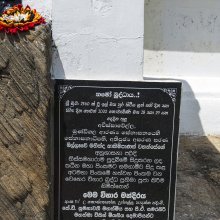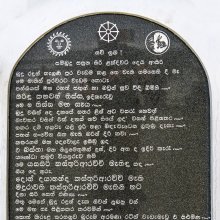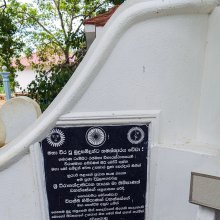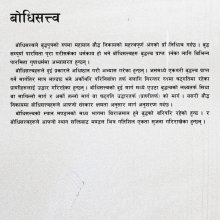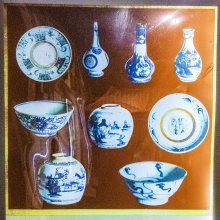Pura, Pūra, Purā, Pūrā, Puṟa, Puṟā: 33 definitions
Introduction:
Pura means something in Buddhism, Pali, Hinduism, Sanskrit, Jainism, Prakrit, the history of ancient India, Marathi, Hindi, biology, Tamil. If you want to know the exact meaning, history, etymology or English translation of this term then check out the descriptions on this page. Add your comment or reference to a book if you want to contribute to this summary article.
Images (photo gallery)
(+2 more images available)
In Hinduism
Dharmashastra (religious law)
Source: Wisdom Library: Dharma-śāstraPura (पुर) refers to “city area” It is used throughout Dharmaśāstra literature such as the Manusmṛti and the Baudhāyana-dharmasūtra.

Dharmashastra (धर्मशास्त्र, dharmaśāstra) contains the instructions (shastra) regarding religious conduct of livelihood (dharma), ceremonies, jurisprudence (study of law) and more. It is categorized as smriti, an important and authoritative selection of books dealing with the Hindu lifestyle.
Purana and Itihasa (epic history)
Source: archive.org: Puranic EncyclopediaPura (पुर).—A demon.
Source: archive.org: Shiva Purana - English TranslationPura (पुर) refers to “harem”, according to the Śivapurāṇa 2.2.22. Accordingly as Śiva said to Sitā:—“[...] O my beloved, beautiful woman, clouds will not reach the place where I have to make an abode for you. [...] The honourable ladies of Himālaya’s harem (pura) will cause immense pleasure to your gracious Self. They will impart you useful instruction, though you need none, with pleasure every day”.
Source: Cologne Digital Sanskrit Dictionaries: The Purana Index1a) Pura (पुर).—Killed by Śiva.*
- * Matsya-purāṇa 55. 16.
1b) City; began with Pṛthu;1 its evacuation by the people for the woods during periods of anarchy.2
- 1) Brahmāṇḍa-purāṇa II. 36. 197; III. 50. 9; 56. 24; 63. 165; 69. 40; IV. 38. 44; Viṣṇu-purāṇa I. 6. 18-19; V. 36. 6; Vāyu-purāṇa 34. 10; 48. 7.
- 2) Matsya-purāṇa 6. 13, 10. 32; 47. 257; 143. 3.
2) Purā (पुरा).—Towns; triangular, round, short or long, condensed; but a square type is celebrated; the chief house, (Palace) measuring 800 Kiṣku.*
- * Brahmāṇḍa-purāṇa I. 5. 99; 7. 93 and 105; Vāyu-purāṇa 8. 99, 113ff.

The Purana (पुराण, purāṇas) refers to Sanskrit literature preserving ancient India’s vast cultural history, including historical legends, religious ceremonies, various arts and sciences. The eighteen mahapuranas total over 400,000 shlokas (metrical couplets) and date to at least several centuries BCE.
Vastushastra (architecture)
Source: archive.org: Personal and geographical names in the Gupta inscriptions (vastu)Pura (पुर).—The Samarāṅgaṇasūtradhāra 10.2 describes puras as being of three kinds—Big, middle and small which have different measurements for their ditches, buildings, streets and road-ways. The big pura one possesses a circumference of four thousand arcs, the middle pura of two thousand arcs and the small pura of one thousand arcs.
Source: OpenEdition books: Architectural terms contained in Ajitāgama and RauravāgamaPura (पुर) refers to “thin plinth § 3.3.”.—(For paragraphs cf. Les enseignements architecturaux de l'Ajitāgama et du Rauravāgama by Bruno Dagens)

Vastushastra (वास्तुशास्त्र, vāstuśāstra) refers to the ancient Indian science (shastra) of architecture (vastu), dealing with topics such architecture, sculpture, town-building, fort building and various other constructions. Vastu also deals with the philosophy of the architectural relation with the cosmic universe.
Kavya (poetry)
Source: archive.org: Naisadhacarita of SriharsaPura (पुर) refers to the “aromatic resin commonly known as Guggulu burnt as incense before idols”, and is mentioned in the Naiṣadha-carita 21.37.

Kavya (काव्य, kavya) refers to Sanskrit poetry, a popular ancient Indian tradition of literature. There have been many Sanskrit poets over the ages, hailing from ancient India and beyond. This topic includes mahakavya, or ‘epic poetry’ and natya, or ‘dramatic poetry’.
Shaktism (Shakta philosophy)
Source: Google Books: ManthanabhairavatantramPura (पुर) refers to “places” such as ‘bodily constituents’, ‘physiological processes’, ‘bodily movements’, etc. according to the Ṣaṭsāhasrasaṃhitā, which is an expansion of the Kubjikāmatatantra: the earliest popular and most authoritative Tantra of the Kubjikā cult.—The Goddess blesses the resident goddess (i.e., Yoginī) and Siddha to have sons and daughters who, produced at her instigation, are considered to be her “mind-born” progeny. [...] The daughters and guardians, like the sons, also have their own residences. These too are “within the body” and form part of the inner dimension (adhyātmā), which is intended only for the practice of Kula yogis. The “places” (pura) in which they reside are not outer parts of the body as is the case with the energies of the Mālinī alphabet. They are instead 1) bodily constituents, such as “bone” and “sinew” and fluids such as “tears”, “semen” and “blood”, 2) physiological processes such as those which produce the “heat” of the body and the “cooking” or digestion of food, 3) the complexion of the body, its “splendour”, “brilliance” and the like, 4) bodily movements such as “quivering”, “running”, “exhalation”, “inhalation” and “coughing”.

Shakta (शाक्त, śākta) or Shaktism (śāktism) represents a tradition of Hinduism where the Goddess (Devi) is revered and worshipped. Shakta literature includes a range of scriptures, including various Agamas and Tantras, although its roots may be traced back to the Vedas.
Pancaratra (worship of Nārāyaṇa)
Source: University of Vienna: Sudarśana's Worship at the Royal Court According to the AhirbudhnyasaṃhitāPurā (पुरा) refers to “ancient times”, according to the Ahirbudhnyasaṃhitā, belonging to the Pāñcarātra tradition which deals with theology, rituals, iconography, narrative mythology and others.—Accordingly, “[...] Out of [his own] head indeed has God, the Lord, created the King in ancient times (purā). Therefore does he have his head anointed and stands above all beings. The King is praised in Revealed Knowledge and Systematized Bodies of Knowledge as a double Brāhmaṇa (i.e. as worth twice as much as a Brāhmaṇa). If one is hostile to him out of delusion, that fool is hostile to Hari [himself]”.

Pancaratra (पाञ्चरात्र, pāñcarātra) represents a tradition of Hinduism where Narayana is revered and worshipped. Closeley related to Vaishnavism, the Pancaratra literature includes various Agamas and tantras incorporating many Vaishnava philosophies.
Ganitashastra (Mathematics and Algebra)
Source: archive.org: Hindu MathematicsPura (पुर) represents the number 3 (three) in the “word-numeral system” (bhūtasaṃkhyā), which was used in Sanskrit texts dealing with astronomy, mathematics, metrics, as well as in the dates of inscriptions and manuscripts in ancient Indian literature.—A system of expressing numbers by means of words arranged as in the place-value notation was developed and perfected in India in the early centuries of the Christian era. In this system the numerals [e.g., 3—pura] are expressed by names of things, beings or concepts, which, naturally or in accordance with the teaching of the Śāstras, connote numbers.

Ganitashastra (शिल्पशास्त्र, gaṇitaśāstra) refers to the ancient Indian science of mathematics, algebra, number theory, arithmetic, etc. Closely allied with astronomy, both were commonly taught and studied in universities, even since the 1st millennium BCE. Ganita-shastra also includes ritualistic math-books such as the Shulba-sutras.
Yoga (school of philosophy)
Source: ORA: Amanaska (king of all yogas): A Critical Edition and Annotated Translation by Jason BirchPūra (पूर) refers to the “inhalation” (of the breath), according to the Yogatārāvalī: a short Yoga text of twenty-nine verses presenting Haṭhayoga as the means to Rājayoga (i.e., Samādhi).—Accordingly, while describing the no-mind state: “Instil [that] no-mind state in me, because of which the eyes become free of opening and closing; the breath, devoid of exhalation and inhalation (pūra) and the mind, free of intentional and discursive thought”.

Yoga is originally considered a branch of Hindu philosophy (astika), but both ancient and modern Yoga combine the physical, mental and spiritual. Yoga teaches various physical techniques also known as āsanas (postures), used for various purposes (eg., meditation, contemplation, relaxation).
In Buddhism
Tibetan Buddhism (Vajrayana or tantric Buddhism)
Source: Wisdom Library: Tibetan BuddhismPūrā (पूरा) is the name of Dūtī (i.e., messengers of Lord Vajrapāṇi) mentioned as attending the teachings in the 6th century Mañjuśrīmūlakalpa: one of the largest Kriyā Tantras devoted to Mañjuśrī (the Bodhisattva of wisdom) representing an encyclopedia of knowledge primarily concerned with ritualistic elements in Buddhism. The teachings in this text originate from Mañjuśrī and were taught to and by Buddha Śākyamuni in the presence of a large audience (including Pūrā).

Tibetan Buddhism includes schools such as Nyingma, Kadampa, Kagyu and Gelug. Their primary canon of literature is divided in two broad categories: The Kangyur, which consists of Buddha’s words, and the Tengyur, which includes commentaries from various sources. Esotericism and tantra techniques (vajrayāna) are collected indepently.
In Jainism
General definition (in Jainism)
Source: The University of Sydney: A study of the Twelve ReflectionsPūra (पूर) refers to a “stream (of the liquid) (ambrosia)”, according to the 11th century Jñānārṇava, a treatise on Jain Yoga in roughly 2200 Sanskrit verses composed by Śubhacandra.—Accordingly, “The doctrine protects all [beings] that are mobile and immobile with regard to the occurrence of misfortune. It also comforts [them] completely with a stream of the liquid ambrosia of happiness (sukha-amṛta-payas-pūra). The rain clouds, wind, sun, moon, earth, ocean and Indra—those, which are protected by the doctrine, are of service to the whole world”.

Jainism is an Indian religion of Dharma whose doctrine revolves around harmlessness (ahimsa) towards every living being. The two major branches (Digambara and Svetambara) of Jainism stimulate self-control (or, shramana, ‘self-reliance’) and spiritual development through a path of peace for the soul to progess to the ultimate goal.
India history and geography
Source: archive.org: Personal and geographical names in the Gupta inscriptionsPura (पुर) or Pur refers to a name-ending for place-names mentioned in the Gupta inscriptions (reigned from 3rd century CE). Also see Pāṇini IV.2.122. In the later Vedic literature the word Pur meant “rampart”, “fort”, or “stronghold”. The meaning of pura as “city” developed later and was not at all in vogue in the Vedic literature. Lexicons define pura as a place containing large buildings surrounded by a ditch and extending not less than one kośa in length, if it extends for half that distance it is called a kheṭa; if less than that, a karvaṭa or small market town, any smaller cluster of houses is called a grāma or village.
T. Burrow derives pura from √pri to fill; Piparti ‘fills’: pur ‘city’: Lithuanian pilis (l becomes r). We find the word being spelt in two ways pur and pura. Pur (city), from puru (much) and pūrṇa (full) means “plentitude” or multitude of settlers. Similarly Greek polis (city) from poly (much): Latin populus (population, people) from plenus (full), and English folk from full. Pur is the city and puruṣa the citizen. Greek polites (citizens), is preserved in politics (civic concerns), police (city administration), and cosmopolitan (citizen of the world): Lithuanian pilis (fort, castle).
Pura, where it does not retain the original from pur, is changed into the following:
- war, as Puruṣapura, Peshawar; Nalapura, Narwar; Matipura, Madwār; Śalvapura, Alwar; Candrapura, Candwar.
- urs or ur, as Māyāpura, Mayura; Siṃhapura, Siṅgur; Juṣkapura, Zukur.
- or, as Traipura, Teor; Candrādityapura, Caindor.
- ora, as Ilbalapura, Ellora.
- ore, as Lavapura, Lahore.
- ola, as Āryapura, Aihole.
- ar, as Kusumapura, Kumrar.
- aur, as Siddhapura, Siddhaur.
- own, as Hiraṇyapura, Hindoun or Herdoun
Pura.—a temple (Ep. Ind., Vol. XXXV, p. 184). See bhavana. Note: pura is defined in the “Indian epigraphical glossary” as it can be found on ancient inscriptions commonly written in Sanskrit, Prakrit or Dravidian languages.

The history of India traces the identification of countries, villages, towns and other regions of India, as well as mythology, zoology, royal dynasties, rulers, tribes, local festivities and traditions and regional languages. Ancient India enjoyed religious freedom and encourages the path of Dharma, a concept common to Buddhism, Hinduism, and Jainism.
Biology (plants and animals)
Source: Wisdom Library: Local Names of Plants and DrugsPura [ପୁର] in the Odia language is the name of a plant identified with Barleria prionitis L. from the Acanthaceae (Acanthus) family having the following synonyms: Barleria appressa, Barleria coriacea, Barleria spicata. For the possible medicinal usage of pura, you can check this page for potential sources and references, although be aware that any some or none of the side-effects may not be mentioned here, wether they be harmful or beneficial to health.

This sections includes definitions from the five kingdoms of living things: Animals, Plants, Fungi, Protists and Monera. It will include both the official binomial nomenclature (scientific names usually in Latin) as well as regional spellings and variants.
Languages of India and abroad
Pali-English dictionary
Source: BuddhaSasana: Concise Pali-English Dictionarypura : (nt.) a town or city. || purā (ind.) formerly; in the past. pūra (adj.) full; full of.
Source: Sutta: The Pali Text Society's Pali-English DictionaryPūra, (adj.) (cp. Class. Sk. pūra; fr. pṛ, see pūreti) full; full of (with Gen.) D. I, 244 (nadī); M. I, 215; III, 90, 96; A. IV, 230; Sn. 195, 721; Ud. 90 (nadī); J. I, 146; Pv IV. 313 (=pānīyena puṇṇa PvA. 251); Pug. 45, 46; PvA. 29.—dup° difficult to fill J. V, 425.—pūraṃ (-°) nt. as adv. in kucchi-pūraṃ to his belly’s fill J. III, 268; Vism. 108 (udara-pūra-mattaṃ). (Page 471)
— or —
Purā, (indecl.) (Vedic purā; to Idg. *per, cp. Goth. faúr= Ags. for=E. (be-) fore; also Lat. prae=Gr. parai/=Sk. pare) prep. c. Abl. “before” (only temporal) Vin. IV, 17 (purāruṇā=purā aruṇā before dawn); Sn. 849 (purā bhedā before dissolution (of the body), after which the Suttanta is named Purābhedasutta, cp. Nd1 210 sq.; expld by sarīra-bhedā pubbaṃ at SnA 549). (Page 469)
— or —
Pura, (nt.) (Vedic pur. f. , later Sk. puraṃ nt. & purī f. ) 1. a town, fortress, city Vin. I, 8=M. I, 171 (Kāsinaṃ puraṃ); J. I, 196, 215; Sn. 976, 991, 1012 (°uttama), 1013; J. VI, 276 (=nagara C); Mhvs 14, 29.—avapure below the fortress M. I, 68.—devapura city of the Gods S. IV, 202; Vv 6430 (=Sudassana-mahā-nagara VvA. 285). See also purindada.—2. dwelling, house or (divided) part of a house (=antepura), a meaning restricted to the Jātakas, e.g. V, 65 (=nivesana C.); VI, 251, 492 (=antepura). Cp. thīpura lady’s room, harem, also “lady” J. V, 296, and antepura.—3. the body (cp. Sk. pura body as given by Halāyudha 2, 355, see Aufrecht p. 273) Th. 1, 279 1150 (so read for pūra, cp. Kern, Toev. s. v. & under sarīradeha).—Cp. porin. (Page 468)

Pali is the language of the Tipiṭaka, which is the sacred canon of Theravāda Buddhism and contains much of the Buddha’s speech. Closeley related to Sanskrit, both languages are used interchangeably between religions.
Marathi-English dictionary
Source: DDSA: The Molesworth Marathi and English Dictionarypura (पुर).—n S A town or city.
--- OR ---
purā (पुरा).—a (pūra S To fill.) Complete or entire; free from deficiency whether of quantity, part, or appendages. 2 Completed, finished, accomplished. 3 Perfect, adept, well versed and skilled in. 4 Sufficient or sufficing. 5 Used as ad Fully, thoroughly, perfectly: also adequately, sufficiently. purā karaṇēṃ To execute (a decree or a process of a court).
--- OR ---
purā (पुरा).—m (pura S) A ward or quarter of a town: also a supplemental or suburban district.
--- OR ---
pūra (पूर).—m (pūra or pūrṇa S) A filling or swelling of rivers; a sudden fresh. v yē. 2 fig. Exuberance, any overflowing plenty. 3 (pura S) A town or city. Usually in comp. as kōlhāpūra, paṇḍharapūra.
Source: DDSA: The Aryabhusan school dictionary, Marathi-Englishpura (पुर).—n A town or city.
--- OR ---
purā (पुरा).—a Complete. Finished. Perfect, adept. Sufficient. ad Fully, thoroughly.
--- OR ---
purā (पुरा).—m A ward or quarter of a town: a suburban district.
--- OR ---
pūra (पूर).—m A Flood. Exuberance. A town or city. Usually in com. as kōlhāpūra, paṇḍharapūra.
Marathi is an Indo-European language having over 70 million native speakers people in (predominantly) Maharashtra India. Marathi, like many other Indo-Aryan languages, evolved from early forms of Prakrit, which itself is a subset of Sanskrit, one of the most ancient languages of the world.
Sanskrit dictionary
Source: DDSA: The practical Sanskrit-English dictionaryPura (पुर).—a. [pṛ-ka] Full of, filled with.
-ram 1 A town, city (containing large buildings, surrounded by a ditch, and not less than one Krośa in extent); पुरे तावन्तमेवास्य तनोति रविरातपम् (pure tāvantamevāsya tanoti ravirātapam) Kumārasambhava 2.33; R.1.59.
2) A castle, fortress, stronghold.
3) A house, residence, abode.
4) The body; नवद्वारे पुरे देही नैव कुर्वन् न कारयन् (navadvāre pure dehī naiva kurvan na kārayan) Bhagavadgītā (Bombay) 5.13.
5) The female apartments.
6) Name of the town पाटलिपुत्र (pāṭaliputra); q. v.
7) The calyx of a flower, or any cup formed of leaves.
8) A brothel.
9) The skin.
1) Bdellium.
11) An upper story.
12) A store-house.
13) A fragrant grass (nāgaramustā).
--- OR ---
Purā (पुरा).—ind.
1) In former times, formerly, of yore, in the olden time; पुरा शक्रमुपस्थाय (purā śakramupasthāya) R.1.75; पुरा सरसि मानसे (purā sarasi mānase) ...यस्य यातं वयः (yasya yātaṃ vayaḥ) Bv.1.3; Manusmṛti 1.119;5.22.
2) Before, hitherto, upto the present time
3) At first, in the first place; रामं दर्शय मे शीघ्रं पुरा मेऽर्थोऽतिवर्तते (rāmaṃ darśaya me śīghraṃ purā me'rtho'tivartate) Rām.7.15.2.
4) In a short time, soon, ere-long, shortly (in this sense usually with a present tense to which it gives a future sense); पुरा सप्तद्वीपां जयति वसुधामप्रतिरथः (purā saptadvīpāṃ jayati vasudhāmapratirathaḥ) Ś. 7.33; पुरा दूषयति स्थलीम् (purā dūṣayati sthalīm) R.12.3; आलोके ते निपतति पुरा सा बलिव्याकुला वा (āloke te nipatati purā sā balivyākulā vā) Meghadūta 87; N.1.18, Śiśupālavadha 1.56; Kirātārjunīya 1. 5;11.36.
5) Ved. For the defence of.
6) Securely from.
7) Except, besides.
--- OR ---
Purā (पुरा).—
1) An epithet of the Ganges.
2) A kind of perfume.
3) The east.
4) A castle. See पुरम् (puram).
--- OR ---
Pūra (पूर).—[pūr-ka]
1) Filling, making full; तमहमुपसृतानां कामपूरं नतोऽस्मि (tamahamupasṛtānāṃ kāmapūraṃ nato'smi) Bhāgavata 8.13.47.
2) Satisfying, pleasing, making content.
3) Pouring in, supplying; अतैलपूराः सुरतप्रदीपाः (atailapūrāḥ suratapradīpāḥ) Kumārasambhava 1.1.
4) The swelling or rising of a river or of the sea, flood; महोदधेः पूर इवन्दुदर्शनात् (mahodadheḥ pūra ivandudarśanāt) R.3.17.
5) A stream or flood in general; अम्बु°, बाष्प°, शोणित° (ambu°, bāṣpa°, śoṇita°) &c.
6) A piece of water, lake, pond.
7) The healing or cleansing of wounds.
8) A kind of cake.
9) Drawing in breath slowly through the nose; प्राणापानौ संनिरुन्ध्यात् पूर- कुम्भकरेचकैः (prāṇāpānau saṃnirundhyāt pūra- kumbhakarecakaiḥ)
1) The citron tree.
-ram A kind of incense.
Derivable forms: pūraḥ (पूरः).
Source: Cologne Digital Sanskrit Dictionaries: Edgerton Buddhist Hybrid Sanskrit DictionaryPura (पुर).—(1) city, as masc. (Sanskrit nt.): Lalitavistara 300.22 (verse) pūrṇāṃ…purāṃ (acc. pl., for pūrṇān…purān); (2) in cpds. with numerals, tri-pura etc., an element in the architecture of a vihāra, according to Tibetan (b)rtseg, upper chamber: Mūla-Sarvāstivāda-Vinaya iii.133.9 ff., monks’ vihāras have five, nuns’ three; a gandhakuṭi, and a bālāgrapūtikā, of monks have seven each, of nuns five.
--- OR ---
Pūra (पूर).—adj., full, and subst. m. (= Pali id.), mss. often pura, in verses meter proves pūra, full measure, full extent, full contents (Sanskrit also nearly in this sense, but usually of water, flood, according to [Boehtlingk and Roth] only fig. of other things); it is doubtful to which meaning some instances belong; (1) adj., udupānā pūrā (or °naṃ pūraṃ) Mahāvastu i.220.20 = ii.23.5 (verse); pūraṃ ca te bhaviṣyati sahasraṃ putrāṇāṃ, and you shall have a full thousand sons, Mahāvastu ii.158.17, and similarly Mahāvastu iii.107.6; 124.3, 8 (verse, putrāṇa te, or me, pūrasahasraṃ, a full thousand of sons); 377.21; yadi pi lokadhātu pūrā bhave…sarṣapehi Mahāvastu ii.295.10, if the universe were full of mustardseeds; (kṣetrā…) pūrā bhavetsuḥ yadi sarṣa- pāṇāṃ 379.13; kṣetrā sahasrā bahuvastra-pūrā 380.9; in Mahāvastu ii.461.21; 462.2, 3, as in some others of our citations, mss. puraṃ (gopiṭakaṃ, q.v.), but Senart seems surely right in his em. pūraṃ, full (cow-basket); contrasted with ūnakaṃ, empty, yaṃ ūnakaṃ (mss. corrupt, but compare next line) taṃ svanati (?) yaṃ pūraṃ śāntam eva taṃ Mahāvastu iii.389.6; pūrārgheṇa, with full value, Śiks 143.6, see s.v. prātimokṣa; (2) subst. m.: (dvau trīn vā) pātra-pūrāṃ (acc. pl.) [Prātimokṣasūtra des Sarvāstivādins] 509.4, bowls-full; dva-tri-pātra-pūrātirikta- grahaṇam Mahāvyutpatti 8455; pātrapūra Divyāvadāna 51.16, 18; °ro dattaḥ 262.22; kaṭacchu- (q.v.)-pūra- Divyāvadāna 475.21; añjali- pūro dattaḥ Karmavibhaṅga (and Karmavibhaṅgopadeśa) 67.16; saptāhapūra, the full extent of a week, a full week, °raṃ ekaparyaṅkenātināmesi Mahāvastu ii.348.15, he spent a full week…: °ram, adv., for a full week, Mahāvastu ii.343.3; 349.2, 3, 5; bhavāgra(q.v.)-pūra, the [Page351-a+ 71] full extent of the top of the universe (or adj.?), heṣṭā upādāya (beginning from the bottom) bhavāgrapūraṃ jāmbūnadasya imaṃ (unmetrical(ly)) buddhakṣetraṃ Mahāvastu ii.378.21 (in same verse Śikṣāsamuccaya 303.1 vi-, for which read pi, bhavāgru yāvat); 380.2, etc.
Source: Cologne Digital Sanskrit Dictionaries: Shabda-Sagara Sanskrit-English DictionaryPura (पुर).—nf. (-raṃ-rī) A town, a city: a place containing large buildings surrounded by a ditch, and extending not less than one Krosha in length, is called a city, a pura or Nagara; if it extends not less than half a Krosha it is called a K'het'a or town; if less than that, a Karvat'a or small market town; and any cluster of houses less than that, is a Grama or village. n.
(-raṃ) 1. A town. 2. A fortress, a castle. 3. The female apartments. 4. A brothel. 5. A house. 6. Pataliputra or modern Patna. 7. The body. 8. The calyx of a flower, or any receptacle or cup formed of leaves. 9. Skin. 10. An upper story. 11. A fragrant grass, (Cyperus.) m.
(-raḥ) 1. A sort of resin, “bdellium.” 2. Yellow berleria. f.
(-rā) 1. The east. 2. A perfume. 3. An epithet of the Ganges. E. pur to precede, ka aff.
--- OR ---
Purā (पुरा).—Ind. 1. An ancient story. 2. Old. 3. Past. 4. Long past, of yore. 5. Near. 6. Future. 7. Proximate future. E. pur to precede, affs. ka and ṭāp.
--- OR ---
Pūra (पूर).—mfn. subst.
(-raḥ-rā-raṃ) A sort of unleavened cake, fried with Ghee or oil. m.
(-raḥ) 1. A piece of water, a large quantity of water, a lake. 2. The healing or cleansing of ulcers. 3. Making content, satisfying. 4. Filling. 5. Supply. 6. Swelling of a river or the sea. 7. A stream, a flood. n.
(-raṃ) A kind of incense. Adj.
(-raḥ-rā-raṃ) Full, filled. E. pūr to fill, ka aff.
Source: Cologne Digital Sanskrit Dictionaries: Benfey Sanskrit-English DictionaryPura (पुर).—i. e. probably pṛ10 + a, I. n. 1. A fortified town, [Mānavadharmaśāstra] 7, 70. 2. A town, 8, 386. 3. The town, i. e. Pāṭaliputra. 4. An abode, [Bhāgavata-Purāṇa, (ed. Burnouf.)] 5, 11, 9. 5. An upper story. 6. The body, [Bhāgavata-Purāṇa, (ed. Burnouf.)] 5, 11, 5. 7. A kind of Cyperus. 8. Skin. Ii. m. 1. A sort of resin, Bdellium. 2. The name of a demon. Iii. f. rā, A perfume. Iv. f. rī (also ri). 1. A town, [Meghadūta, (ed. Gildemeister.)] 31. 2. The body, [Bhāgavata-Purāṇa, (ed. Burnouf.)] 2, 10, 28.
--- OR ---
Purā (पुरा).— (old instrum. sing. of a base pura, for para, cf. puras; u is changed to a by the influence of the preceding p); I. adv. 1. Formerly, [Mānavadharmaśāstra] 1, 119. 2. Of old, Böhtl. Ind. Spr. 1231. 3. With na, Never, Mahābhārata 9, 1806. 4. First. 5. Soon. Ii. prep. with abl., Before, [Arjunasamāgama] 4, 20.
— Cf. (old loc.) in (old dat.), etc.; perhaps also with etc.; [Gothic.] faura and faur; [Anglo-Saxon.] for, fora-, fore-; [Latin] por-, e. g. in por-tendere, and probably also prō-.
--- OR ---
Pūra (पूर).—[pūr + a], m. 1. Filling, [Bhāgavata-Purāṇa, (ed. Burnouf.)] 6, 9, 7. 2. A large quantity of water, [Raghuvaṃśa, (ed. Stenzler.)] 3, 17. 3. A cake, [Rāmāyaṇa] 2, 100, 64 Gorr. 4. Drawing in breath through the nose, a religious practice, [Bhāgavata-Purāṇa, (ed. Burnouf.)] 3, 28, 9. 5. The healing or cleansing of ulcers.
Source: Cologne Digital Sanskrit Dictionaries: Cappeller Sanskrit-English DictionaryPura (पुर).—[neuter] ī [feminine] the same.
--- OR ---
Purā (पुरा).—[adverb] formerly, once upon a time, of yore; up to the present time, hitherto ([with] [present] ±sma); at first, firstly; soon, shortly ([with] [present]); [with] a neg. never. — As a [conjunctive] ere, before ([with] [present] ±na, mā, or yadi); as a [preposition] before, from, except, without ([ablative]).
--- OR ---
Pūra (पूर).—[adjective] filling, completing, satisfying (—°); [masculine] completion, fulfilment, satisfaction; flood, gush, stream; a cake.
Source: Cologne Digital Sanskrit Dictionaries: Monier-Williams Sanskrit-English Dictionary1) Pura (पुर):—[from pur] 1. pura (for 2. See p.635), in [compound] for puras.
2) Purā (पुरा):—[from pur] a ind. (cf. pra, puras, pūrva) before, formerly, of old (with na, ‘never’), [Ṛg-veda] etc. etc.
3) [v.s. ...] in a previous existence, [Varāha-mihira’s Yogayātrā]
4) [v.s. ...] (with [present tense] = [perfect tense]) from of old, hitherto, up to the present time (also with sma cf. [Pāṇini 3-2, 122]; with na, ‘never yet’), [Ṛg-veda] etc. etc.
5) [v.s. ...] at first, in the beginning, [Bhartṛhari] (opp. to paścā, paścāt, [Pāṇini 5-3, 33; Kāśikā-vṛtti])
6) [v.s. ...] soon, shortly (with [present tense]= [future]), [Kālidāsa; Naiṣadha-carita]
7) [v.s. ...] (as [preposition], mostly in earlier language, with [ablative], rarely with [dative case] or [genitive case]) before
8) [v.s. ...] securely from
9) [v.s. ...] except, beside
10) [v.s. ...] (with [present tense]= [future] cf. [Pāṇini 3-3, 4], once with [Potential]) ere, before (sometimes with na or na and yāvat [followed by tāvat], with mā or yadi, [Mahābhārata; Kāvya literature etc.])
11) Pura (पुर):—[from pur] 2. pura n. (for 1. See p. 634, col. 2) (ifc. f(ā). ) a fortress, castle, city, town (a place containing large buildings surrounded by a ditch and extending not less than one Kos in length ; if it extends for half that distance it is called a kheṭa, if less than that, a karvaṭa or small market town; any smaller cluster of houses is called a grāma or village, [Horace H. Wilson]), [Manu-smṛti; Mahābhārata] etc.
12) [v.s. ...] the female apartments, gynaeceum, [Mahābhārata] (cf. antaḥ-p, nārī-p etc.)
13) [v.s. ...] a house, abode, residence, receptacle, [Bhāgavata-purāṇa; Tattvasamāsa]
14) [v.s. ...] an upper story, [cf. Lexicographers, esp. such as amarasiṃha, halāyudha, hemacandra, etc.]
15) [v.s. ...] a brothel, [cf. Lexicographers, esp. such as amarasiṃha, halāyudha, hemacandra, etc.]
16) [v.s. ...] ‘the city’ [Greek] κατ᾽ ἐξοχήν id est. Pāṭali-putra or Patnā, [cf. Lexicographers, esp. such as amarasiṃha, halāyudha, hemacandra, etc.]
17) [v.s. ...] = tri-pura, the 3 strong holds of the Asuras, [Kathāsaritsāgara]
18) [v.s. ...] the body (cf. 3. pur), [Bhāgavata-purāṇa]
19) [v.s. ...] the skin, [cf. Lexicographers, esp. such as amarasiṃha, halāyudha, hemacandra, etc.]
20) [v.s. ...] a species of Cyperus, [cf. Lexicographers, esp. such as amarasiṃha, halāyudha, hemacandra, etc.]
21) [v.s. ...] Name of a constellation, [Varāha-mihira]
22) [v.s. ...] a leaf rolled into the shape of a funnel, [cf. Lexicographers, esp. such as amarasiṃha, halāyudha, hemacandra, etc.] ([probably] [wrong reading] for puṭa)
23) [v.s. ...] Name of the subdivisions of the Vedānta [work] tripurī or tripuṭī (perhaps also [wrong reading] for puṭa), [Catalogue(s)]
24) [v.s. ...] mf(ā)n. a kind of resin, bdellium, [Suśruta; cf. Lexicographers, esp. such as amarasiṃha, halāyudha, hemacandra, etc.]
25) [v.s. ...] m. Name of an Asura= tri-pura (cf. pura-jit), of another man, [gana] kurv-ādi
26) Purā (पुरा):—[from pura > pur] b f. a stronghold, fortress (cf. agni-purā and aśma-p)
27) [v.s. ...] a kind of perfume, [cf. Lexicographers, esp. such as amarasiṃha, halāyudha, hemacandra, etc.]
28) c See p. 634, col. 3.
29) Pūra (पूर):—mfn. (√pṝ, [Causal]) filling, making full (cf. pāṇi-)
30) fulfilling, satisfying (cf. kāma-)
31) m. the act of filling, fulfilling etc., [Kāvya literature; Purāṇa]
32) the swelling or rising of a river or of the sea, a large quantity of water, flood, stream (also met. = abundance, high degree, [especially] ifc.), [Kāvya literature; Suśruta] etc.
33) a cake, [Rāmāyaṇa] (cf. ghṛta-)
34) a kind of breath-exercise = pūraka below, [Bhāgavata-purāṇa]
35) the cleansing of a wound, [cf. Lexicographers, esp. such as amarasiṃha, halāyudha, hemacandra, etc.] (cf. pūraṇa)
36) the citron tree (= bīja-pūra), [cf. Lexicographers, esp. such as amarasiṃha, halāyudha, hemacandra, etc.]
37) n. a kind of incense, [cf. Lexicographers, esp. such as amarasiṃha, halāyudha, hemacandra, etc.]
38) bdellium, [cf. Lexicographers, esp. such as amarasiṃha, halāyudha, hemacandra, etc.]
39) mf(ā)n. a sort of unleavened cake fried with ghee or oil, [Horace H. Wilson] (cf. pūrikā below).
Source: Cologne Digital Sanskrit Dictionaries: Yates Sanskrit-English Dictionary1) Pura (पुर):—[(raṃ-rī) n. f.] A town or city. 1. m. A sort of resin, bdellium; yellow barleria. f. (rā) The east; a perfume. n. A house; body; calyx; skin; a grass.
2) Purā (पुरा):—adv. An ancient story, old; past, future; near.
3) Pūra (पूर):—(raḥ) 1. m. A lake; healing ulcers. m. f. n. Unleavened cake fried with ghee or oil. a. Full.
Source: DDSA: Paia-sadda-mahannavo; a comprehensive Prakrit Hindi dictionary (S)Pura (पुर) in the Sanskrit language is related to the Prakrit words: Pura, Purillā, Pūra, Pella.
[Sanskrit to German]
Sanskrit, also spelled संस्कृतम् (saṃskṛtam), is an ancient language of India commonly seen as the grandmother of the Indo-European language family (even English!). Closely allied with Prakrit and Pali, Sanskrit is more exhaustive in both grammar and terms and has the most extensive collection of literature in the world, greatly surpassing its sister-languages Greek and Latin.
Hindi dictionary
Source: DDSA: A practical Hindi-English dictionary1) Pura (पुर) [Also spelled pur]:—(nm) a town, city; large leather pot for drawing huge quantity of water out of a well; chamber, room (as [ata:pura]); (a) filled with, full of; ~[jana] townfolk; inhabitants of a city/town; ~[devatā] the protecting deity of a town; ~[dvāra] main gate of a city/the main entrance to a city/town; ~[nārī] a prostitute, harlot; ~[vadhū] see ~[nārī; ~vāsī]; see ~[jana].
2) Purā (पुरा):—(adv) in the past, in olden times; (nm) a small village, hamlet; ~[kathā] ancient story; old narrative; ~[kalpa] olden times, ancient age.
3) Pūra (पूर) [Also spelled pur]:—(nm) stuffing in a sweet delicacy; spate; irrigation by drawing water from a well by a leathern bag; sufficiency, adequacy; —[ḍālanā] to satisfy the requirements/needs; —[paḍanā] to suffice, to be sufficient, to cause to be gratified/satisfied.
4) Pūrā (पूरा):—(a) complete; all, whole, entire; full; gross; total; thorough; adequate; (nm) sufficiency, adequacy; —[utaranā] to deliver the goods, to come upto the expectations; to pass a test successfully; —[utaranā] ([koī kāma]) to be duly accomplished; to be fulfilled; —[paḍanā, kisī kā] to be sufficient; not to be wanting; [pūre karanā, dina] to mark time; to keep somehow alive; [pūre honā, dina] death to be imminent, to have consumed one’s allotted time (of life); to have completed the period of gestation.
...
Prakrit-English dictionary
Source: DDSA: Paia-sadda-mahannavo; a comprehensive Prakrit Hindi dictionary1) Pura (पुर) in the Prakrit language is related to the Sanskrit word: Pura.
2) Purā (पुरा) also relates to the Sanskrit word: Pur.
3) Pūra (पूर) also relates to the Sanskrit word: Pūra.
4) Pūra (पूर) also relates to the Sanskrit word: Pūra.
Prakrit is an ancient language closely associated with both Pali and Sanskrit. Jain literature is often composed in this language or sub-dialects, such as the Agamas and their commentaries which are written in Ardhamagadhi and Maharashtri Prakrit. The earliest extant texts can be dated to as early as the 4th century BCE although core portions might be older.
Kannada-English dictionary
Source: Alar: Kannada-English corpusPura (ಪುರ):—[noun] an overflowing of water on an area normally dry; inundation; deluge; flood.
--- OR ---
Pura (ಪುರ):—
1) [noun] a fortified place.
2) [noun] a town (usu. larger than a village but smaller than a city).
3) [noun] a dwelling place; a house.
4) [noun] the physical body (of human beings).
5) [noun] a myrrhlike gum resin obtained from various trees esp. trees of Burseraceae family; bdellium.
6) [noun] the grass Cyperus rotundus( = C. hexastachyus) of Cyperaceae family.
7) [noun] its bulbous root.
8) [noun] (myth.) one of three cities built in the sky by three daemons which was destroyed by Śiva.
9) [noun] a village gifted to a person (by a king).
10) [noun] (used as a suffix to many names of) a part or extension of a city.
11) [noun] (math.) a symbol for the number three.
--- OR ---
Pūra (ಪೂರ):—
1) [noun] the act of filling (something with) or being filled in.
2) [noun] the act of giving pleasure to; a satisfying.
3) [noun] a pouring or being poured; (as a liquid).
4) [noun] an overflowing of a river, water body, etc; flood.
5) [noun] a continuous, forceful flow (as of water in a river); a stream.
6) [noun] a relatively large receptical of water, as a reservoir.
7) [noun] a localised sore and infected spot on the body with the tissues ruptured or abraded; a sore.
8) [noun] any of the several food preparations made of different kinds of flours.
9) [noun] the citrus tree Ciitrus medica of Rutaceae family; lemon tree.
10) [noun] its fruit.
11) [noun] an inhaling of air into the lungs in a reguated way in prāṇāyāma (the yogic breathing exercise).
--- OR ---
Pūra (ಪೂರ):—
1) [adverb] to the greatest degree.
2) [adverb] completely; fully; entirely.
--- OR ---
Pūrā (ಪೂರಾ):—[adverb] = ಪೂರ [pura]2.
--- OR ---
Pūṟa (ಪೂಱ):—[noun] either of the two fleshy protuberances forming the lower and back part of the trunk in humans; the buttock.
Kannada is a Dravidian language (as opposed to the Indo-European language family) mainly spoken in the southwestern region of India.
See also (Relevant definitions)
Starts with (+875): Poorak-bajet, Punagadubu, Pura-garnu, Pura-icivucanni, Pura-katupatal, Pura-kirutapavam, Pura-kuttuvelai, Pura-matirceri, Pura-mattainar, Pura-nilaikaruvi, Pura-nilaimarutam, Pura-nilaivalttu, Pura-niracarpu, Pura-pataivitu, Pura-pattuvannam, Pura-porul-venpamalai, Pura-pradhana, Pura-purakaruvi, Pura-puramulavu, Pura-shreshthin.
Ends with (+868): Abhayapura, Abhimanyupura, Abhipura, Abhrapura, Acalapura, Achalapura, Adharapura, Aditijapura, Adityapura, Agariyapura, Aggalapura, Aghatapura, Agnipura, Agrapura, Ahipura, Ajapura, Aka apura, Akamthapura, Akarnapura, Akhandalapura.
Full-text (+1847): Puram, Puras, Dashapura, Puravasu, Purahphala, Karnapura, Purah, Pura-garnu, Ghritapura, Shonitapura, Devapura, Supura, Manipura, Shashankapura, Antahpura, Purakrita, Puraga, Pur, Bijapura, Purashasana.
Relevant text
Search found 150 books and stories containing Pura, Pūra, Purā, Pūrā, Puṟa, Puṟā, Pūṟa, Puraa; (plurals include: Puras, Pūras, Purās, Pūrās, Puṟas, Puṟās, Pūṟas, Puraas). You can also click to the full overview containing English textual excerpts. Below are direct links for the most relevant articles:
Warfare and Military System in Vedic Literature (by Rinki Deka)
Fortification and Siegecraft < [Chapter 2 - Military System as Revealed in the Vedic Texts]
The Deployment of Battle Array and Camps < [Chapter 4 - Principles and Ethics related to the Warfare]
The Office of the Royal Priest and His Duties < [Chapter 3 - The Religious observances and other Beliefs related to the Warfare]
Rig Veda (translation and commentary) (by H. H. Wilson)
Garga Samhita (English) (by Danavir Goswami)
Verse 1.2.31 < [Chapter 2 - Description of the Abode of Śrī Goloka]
Verse 5.16.11 < [Chapter 16 - Comforting Sri Radha and the Gopis]
Verse 4.6.27 < [Chapter 6 - The Story of the Ayodhyā Women]
Bhakti-rasamrta-sindhu (by Śrīla Rūpa Gosvāmī)
Verse 3.3.99 < [Part 3 - Fraternal Devotion (sakhya-rasa)]
Verse 2.1.217 < [Part 1 - Ecstatic Excitants (vibhāva)]
Verse 3.5.20 < [Part 5 - Conjugal Love (mādhurya-rasa)]
Brihad Bhagavatamrita (commentary) (by Śrī Śrīmad Bhaktivedānta Nārāyana Gosvāmī Mahārāja)
Verse 2.1.166 < [Chapter 1 - Vairāgya (renunciation)]
Verse 2.1.35-37 < [Chapter 1 - Vairāgya (renunciation)]
Verse 1.6.125 < [Chapter 6 - Priyatama (the most beloved devotees)]
Related products
